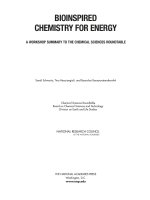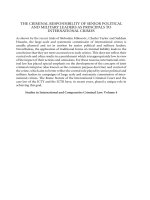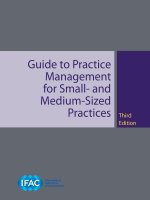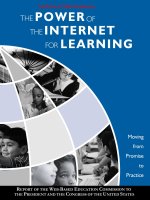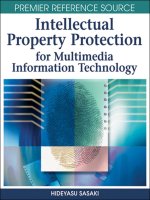Searching for internet information as materials to practice speaking skill unit 12 the asian games part b speaking (english 11)
Bạn đang xem bản rút gọn của tài liệu. Xem và tải ngay bản đầy đủ của tài liệu tại đây (277.27 KB, 16 trang )
THANH HOA EDUCATION AND TRAINING DEPARTMENT
HOANG HOA 3 HIGH SCHOOL
EXPERIENCE INITIATIVE
SEARCHING FOR INTERNET INFORMATION
AS MATERIALS TO PRACTICE SPEAKING SKILL
IN UNIT 12: THE ASIAN GAMES – PART B: SPEAKING
(ENGLISH 11)
Implementer: Lê Thị Gấm
Position: Teacher
Experience initiavtive in the subject: English
THANH HOA YEAR 2017
CONTENT TABLE
CONTENTS
PART I: OPENING
I. Reasons for choosing the theme
II.
Study purposes
III. Study objects
IV. Study methods
V.
Some innovations of the theme
PART II: STUDY CONTENTS
Chapter I: Argument grounds
1. Theoritical grounds.
2. Practical grounds.
Chapter II: Real situations
1. Students.
2. Teachers.
3. Material facilities.
4. Survey results before Unit 12.
Chapter III: Some experience used to improve real situations
I. Basic steps of teaching a speaking lesson in English.
1. Pre - speaking.
2. While – speaking.
3. Post – speaking.
II. Some experience applied in teaching the speaking skill in
Unit 12 – The Asian Games – Part B: Speaking (English 11)
1. Before the lesson
2. During the lesson
2.1. Controlled practice
2.1.1. Pair work
2.1.2. Individual work
2.2. Further practice
2.2.1. Expected information searched by students
2.2.2. Presentation
2.2.3. Evaluation
3. After the lesson
3.1. Games: Names of sports
3.2. Homework
Chapter IV: Study results, experience lessons and measures
1. Study results.
2. Experience lessons and measures.
PART III: CONCLUSION AND PROPOSALS
1. Conclusion.
2. Proposals.
PAGES
3
3
3
3
4
4
5
5
5
5
6
6
6
6
6
7
7
7
7
7
8
8
8
9
9
9
9
9
12
12
12
12
12
13
13
13
14
14
14
PART I: OPENING
I. REASONS FOR CHOOSING THE THEME.
With the speedy development of the world today, English is widely used in
every field of life. It is not only the native language of many countries but also
the most popular communication language of people around the world.
In order to promote international integration, communication languages
especially English have played an integral part in understanding and cooperation
among nations. Therefore, our Vietnamese education has paid special attention
to teaching English at schools. Among the skills, speaking is considered to be
the most important one. It helps us communicate, understand and cooperate with
each other easily.
Learning a language without being able to speak it in specific situations of
daily life is like having hands but using them for nothing. It is no use learning a
language without using it for oral communication purposes. Moreover, English
is an international language which is widely used in most international and
regional events. Speaking English fluently and confidently helps students a lot
not only in their life but also in their future work.
With those practical goals, the English program at secondary school centres
on forming and developing basic knowledge and skills to students about the
English language and necessary intellectual qualities so that they can either
continue further study or start their working life.
To meet these practical demands, each teacher should study and choose
teaching methods which are suitable to both himself/herself and his/her students.
This is very important to achieve good teaching and learning results.
Actually, at most countryside schools in general and at Hoang Hoa 3 High
School in particular, the results of teaching and learning English have been
better and better recently, but there exist many disadvantages. The biggest
difficulty here, I think, is how to help students speak English fluenty not only in
class but also in real life.
With my experience in teaching English at Hoang Hoa 3 High School, I have
researched reference documents, learned from co-workers as well as applied
many different teaching methods. I have gained some first positive results, so I
would like to choose the theme “Searching for internet information as
materials to practice speaking skill in Unit 12: The Asian Games – Part B:
Speaking (English 11)”.
II. STUDY PURPOSES.
- Analysing real situations of teaching the speaking skill.
- Presenting some experience in teaching the speaking skill to raise learning
effects.
- Bettering the results of speaking lessons.
- Helping students feel confident when they present their ideas in English in
front of other people.
III. STUDY OBJECTS.
- Real situations of teaching the speaking skill at Hoang Hoa 3 High School.
- Unit 12: The Asian Games – Part B: Speaking (English 11).
IV. STUDY METHODS.
1. Exploiting the basic English textbook 11 and reference documents.
2. Exploiting teaching aids.
3. Exploiting the internet.
4. Working positively individually and in small groups.
V. SOME INNOVATIONS OF THE THEME.
- Not depending on controlled tasks in textbook completely
- Promoting students’ abilities to exploit information in the Internet.
- Providing students with chances to cooperate with each other in
completing their duty, so that students can learn how to solve the
problems by themselves.
- Bettering students’ confidence when they speak in front of other people.
PART II: STUDY CONTENTS
CHAPTER I: ARGUMENT GROUNDS
1. Theoritical grounds.
Just when students start learning English, they get accustomed to four
basic skills: listening, speaking, reading and writing. It is through these four
skills that teachers pass knowledge to students and students gain their
knowledge. Among these four skills, speaking is an important skill to students. It
requires that teachers not only understand well effective teaching methods but
also apply smoothly the principle “Learning parallels hands-on” [5]
Starting from the view of “Learners are the centre”, teaching and learning
methods have changed greatly. Teachers are not those who hold knowledge and
pass it to students, but those who guide, support, consult and check students’
working. Students do not absorb knowledge passively. Becoming the centre of
the teaching-learning process, students are completely active and creative in
study to achieve good learning results and know how to apply knowledge in real
life. [4]
From the grounds above, how to apply innovative methods of teaching the
speaking skill is very important. It helps students feel confident when they
present their ideas in front of other people and communicate effectively in daily
life.
2. Practical grounds.
Most high schools have used new English teaching and learning materials,
which ask students to develop equally all four skills, among which the speaking
one requires that students have to spend much time practising not only in class
time but also outside class so that they can communicate better in English.
In order to raise the effect of speaking lessons, teachers had better study
each lesson carefully, ask students to prepare necessary things before the
lessons, find out and apply a wide variety of practice forms which are suitable to
material facilities of each school to improve students’ English.
When experimenting in some classes of grade 11 at my school, I have
gained some encouraging results. My periods of teaching speaking skill become
more interesting, which makes students more active and betters their
communication in English.
CHAPTER II: REAL SITUATIONS
1. Students.
Generally, the level of students’ knowledge is quite low due to the difficult
economic conditions. Besides, the English knowledge of students is not equal in
the same class and among classes in the same grade. Besides, the number of
students in a class is quite high (about 40-45 students). These result in
difficulties when teachers decide to choose methods as well as control class
activites during speaking lessons.
2. Teachers.
After testing some teaching methods, teachers often feel discouraged
because students do not participate in activities actively. Thus, the practical
results are not as good as expected ones. Gradually, teachers seem not to pay
serious attention to speaking lessons. They often use some simple traditional
techniques to teach speaking tasks in each unit quickly. Therefore, most of class
time is spent on controlled tasks in textbook.
3. Material facilities.
Due to the lack of essential material facilities especially projectors, most
teachers do not make full use of such document sources as the Internet, pictures,
video clips,…
With these limitations, the effect of speaking tasks is not good enough to
satisfy the general purposes. It is like a vicious circle which has no exit for quite
a long time.
4. Survey results before Unit 12.
Class
11A1
11A6
11A7
Student
number
39
47
43
Dislike
09
10
12
Levels of interest
Normal
12
21
20
Like
18
16
11
CHAPTER III:
SOME EXPERIENCE USED TO IMPROVE REAL SITUATIONS
I. Basic steps of teaching a speaking lesson in English.
1. Pre - speaking.
- Warm students up before speaking lessons by some ways such as: games,
pictures, videos,…
- Introduce purposes and topics that students are going to talk about, help
students recall related things they have gained to prepare for their speaking.
(This not only helps good students revise their knowledge but also helps other
students have necessary materials before doing the required tasks).
- Help students know some useful languages like vocabularies, structures that
help them speak more effectively.
This part is very important because it helps prepare necessary things for
the speaking lesson. Thus, it is necessary that students know how to pronounce
words and phrases correctly, understand how to use the structures effectively.
2. While – speaking.
Depending on different speaking tasks, teachers may let students work in
one of the following ways.
a. Working in pairs.
Basing on the requirements, students can ask and answer using the given
suggestion. They also role-play in conversations or talk about some other things.
b. Working in small groups.
Each group should appoint a secretary who selects and writes down other
students’ ideas. All group members take part in the group discussion on a
specific topic by giving their own ideas and viewpoints. Other members listen
and express their opinions, add further information or give the opposite
ideas….After finishing discussion, all group members check their discussion
ideas again together and get ready to present their discussion.
While students are working, the teacher should go round to help them if
they have difficulties in vocabulary, structures, idea expressions,…
3. Post – speaking.
This is utmost importance. In this step, students present their groups’
discussion in front of the whole class. This helps students practice some
important skills in speaking such as patience, confidence, concentration,
reaction, persuasiveness, manner,…
This is also a completion step of a speaking lesson. Thus, teachers should
pay serious attention and never pass it easily because it helps students a lot in
completing, self-checking their own speaking skill and improving their language
knowledge by themselves.
II. Some experience applied in teaching the speaking skill in Unit 12 – The
Asian Games – Part B: Speaking (English 11)
1. Before the lesson
- Divide students in each class into 6 groups.
- Give each group a task for them to prepare at home: Students have to search
the Internet for required information which they will use to present in the
speaking lesson.
- Ask each group either to write their preparation on the A 0 paper or present their
preparation in powepoint slides to display on the projector screen (Students may
insert pictures, images to make their products more interesting).
+ Ask students of 3 groups to search for the information about the Asian
Games and complete the following table:
( Group 1: The 15th Asian Games
Group 2: The 16th Asian Games
Group 3: The 17th Asian Games)
THE……….ASIAN GAMES
Host
Year
country
Number Number Number Country
Medals
of
of
of
ranked
Total Gold Silver Bronze
countries athletes sports
1st
+ Ask students of 3 other groups to search for the information about the
medals won at the Asian Games by Vietnamese athlethes and complete the
following table:
( Group 4: The 15th Asian Games
Group 5: The 16th Asian Games
Group 6: The 17th Asian Games)
MEDALS WON BY VIETNAM
(at the…….Asian Games held in………..)
Sports
Gold medals Silver medals Bronze medals
……(by…)
……(by…)
……(by…)
……(by…)
……(by…)
Total
Rank
Total
2. During the lesson
2.1. Controlled practice
Ask students to read the information in the table – page 139 textbook
English 11 and make sure they understand the given information.
2.1.1. Pair work
- Ask students to work in pairs to ask and answer about the Asian Games, using
the information from the table.
Example:
A: When and where were the 1st Asian Games held?
B: (They were held) in 1951 in India.
A: How many countries took part in the Games?
B: Eleven (countries took part in the Games)
A: How many sports were there at the Games?
B: (There were) six (sports at the Games). [1]
- Call pairs of students to ask and answer similarly as the given example. They
replace the underlined information in the example with information from the
table. [2]
2.1.2. Individual work
- Present some more useful phrases to help student talk individually:
+ take place in…. = be held in…
+ with the participation of….countries
+ take part in / participate in…….(different) sports [3]
- Ask students to work individually to talk about the Asian Games using the
information in the table and the suggestion above.
- Call students to talk. (Each student talks about one Asian Games)
2.2. Further practice
Before students present their tasks, the teacher checks each group’s
preparation to prepare some other necessary things to help students do their
tasks better such as magnet, laptop, projector,…
2.2.1. Expected information searched by students
Group 1:
THE 15TH ASIAN GAMES
Number Number Number Country
Medals
of
of
of
ranked
Total Gold Silver Bronze
countries athletes sports
1st
2006
45
10500
39
China 1393 428 423
542
(316
medals:
165
golds,
88
silvers,
Host
Year
country
Qatar
63
bronzes)
[6]
Group 2:
THE 16TH ASIAN GAMES
Number Number Number Country
Medals
of
of
of
ranked
Total Gold Silver Bronze
countries athletes sports
1st
China
(325
medals:
163
2010
45
9704
42
golds, 1114 338 340
436
83
silvers,
79
bronzes)
Host
Year
country
China
[6]
Group 3:
THE 17TH ASIAN GAMES
Number Number Number Country
Medals
of
of
of
ranked
Total Gold Silver Bronze
countries athletes sports
1st
China
(342
medals:
151
2014
45
9501
36
golds, 1454 439 430
576
108
silvers,
83
bronzes)
Host
Year
country
Korea
[6]
Group 4:
MEDALS WON BY VIETNAM
(at the 15th Asian Games held in Doha, Qatar)
Sports
Shooting
Billiards
Sepaktakraw
Gold medals
0
0
2 (1 team,
1 pair: Luu
Thi Thanh,
Nguyen Hai
Silver medals Bronze medals
1
3
1
0
1
0
Total
4
1
3
Chess
Weightlifting
Karatedo
Taewondo
Bodybuilding
Wushu
Thao)
0
0
1 (by Vu Thi
Nguyet Anh)
0
0
0
Total
Rank
1
1
0
0
1
1
2
1
4
2
1
3
3
0
0
5
1
3
23
19/45
[6]
Group 5:
MEDALS WON BY VIETNAM
(at the 16 Asian Games held in Guangzhou, China)
th
Sports
Karatedo
Shooting
Wushu
Chess
Athletics
Rowing
Sepaktakraw
Taewondo
Wrestling
Billiards
Gold medals Silver medals Bronze medals
1 (women’s
sepaktakraw:
Thuy An,
1
1
Thu Ba,
Bach Van)
0
2
1
0
4
4
0
2
1
0
3
2
0
2
0
0
1
1
0
1
3
0
1
0
0
0
2
Total
Rank
Total
3
3
8
3
5
2
2
4
1
2
33
24/45
[6]
Group 6:
MEDALS WON BY VIETNAM
(at the 17th Asian Games held in Incheon, Korea)
Sports
Wushu
Karatedo
Weightlifting
Shooting
Gold medals
1 (by Duong
Thuy Vi)
0
0
0
Silver medals Bronze medals
Total
1
4
5
1
1
2
1
0
5
2
1
7
Rowing
Gymnastics
Cycling
Athletics
Boxing
Fencing
Sepaktakraw
Swimming
Taewondo
0
0
0
0
0
0
0
0
0
1
1
1
2
0
0
0
0
0
Total
Rank
2
3
0
0
2
2
1
2
3
3
4
1
2
2
2
1
2
3
36
21/45
[6]
2.2.2. Presentation
- The order of presentation:
1. Group 1 – Group 4 (Information about the 15th Asian Games)
2. Group 2 – Group 5 (Information about the 16th Asian Games)
3. Group 3 – Group 6 (Information about the 17th Asian Games)
- The way of presentation:
+ The representative of each group (one by one) goes to the board and
present his/her group’s product basing on the information on A0 papers
or slides.
+ Other students listen to the presentation and take notes (if necessary)
2.2.3. Evaluation
- Students’ evaluation: Call students to give their remarks about each
presentation (Good things and bad things)
- Teacher’s evaluation:
+ Remark students’ work in general: preparation, presentation, manner,...
+ Give detailed remarks to each group’s work on the ground of
encouraging students’ participation.
3. After the lesson
3.1. Games: Names of sports
a) Objectives: After the process of preparation and practice, students have
already known many names of sports. Being involved in the game, students will
have a good chance to recall their vocabulary relating to sport names. Besides,
they can enrich their vocabulary naturally and actively.
b) Preparation: 4 small gifts with different sizes (candies, snack, pens,
pencils,…)
c) Procedures:
- Divide the board into 4 equal parts.
- Call 4 voluntary students to the board.
- Give students 3 minutes to write down as many sport names as they can.
- Ask the whole class to check and decide the order of the participants.
- Let the winner choose his/her gift first, then the participants with
numbers 2, 3 and 4 respectively.
3.2. Homework: Talking about the athlete you admire most.
Suggestions:
Name, age, place of birth, some physical characteristics
Sport(s) he/she specializes in
Achievements
(Other talents)
If students want to have enough information, they may exploit sources in
the Internet for their talk.
CHAPTER IV:
STUDY RESULTS, EXPERIENCE LESSONS AND MEASURES
1. Study results.
Through the study and lesson which are designed and carried out
according to the suggested ways, most students become more interested in the
speaking lesson. Besides, they take part in the speaking tasks more actively. As a
result, the quality of students’ participation has improved greatly. Students who
used to be afraid of speaking lessons have found it less difficult. They can easily
do many simple tasks before doing the main tasks. Gradually, their confidence
and interest increase after each lesson. This plays an important role in bettering
students’ speaking.
Survey results after the lesson.
Class
11A1
11A6
11A7
Student
number
39
47
43
Dislike
02
05
07
Levels of interest
Normal
10
12
12
Like
27
30
24
2. Experience lessons and measures.
After studying and experimenting the lesson, attending co-workers’
periods, I find that in order to achieve high results in teaching English in general
and teaching the speaking skill in particular, teachers must be enthusiastic and
try to design the lesson suitably to each class basing on the main teaching
contents. Besides, they should understand their students, so they can know how
to design each lesson effectively. Teachers should define the objectives and core
requirements of each lesson clearly. They should also know how to use and
combine different teaching methods flexibly and creatively so that they are
suitable to contents of each lesson, students of each class. As a result, students
would become more eager when taking part in designed activites.
Besides, teachers should research seriously to change teaching techniques
which are used repeatedly lesson by lesson in order to avoid boredom. This is
also a good way to promote students’ active participation in different activities.
This helps to bring positive learning results.
When designing each lesson in general and speaking lessons in particular,
teachers should take into account many things such as the available material
facility conditions of their school (projectors, pictures, real objects, video clips,
…) Thus, teachers can decide the best ways to design and exploit each lesson as
well as use teaching aids effectively. All these things help teachers know how to
prepare and present the lesson actively and effectively. This helps to gain
educational purposes.
PART III: CONCLUSION AND PROPOSALS
1. Conclusion.
These are only some of the methods and teachniques which I have applied
in teaching the speaking lesson of Unit 12 (English 11). They have helped to
better students’ participation and speaking practice. However, the most
important thing that should be focused here is that teachers should highly
concentrate on researching, designing and applying effective ways to achieve
educational purposes: conveying knowledge and bettering students’ skills.
Besides, teachers should be friendly to students so that they can create the
friendly class atmosphere, this is very useful especially to speaking periods.
The study theme cannot help having limitations. I look forward to
receiving remarks and contributions from other co-workers in order to better this
study.
2. Proposals.
I would like school leaders to create better conditions for teaching and
learning activites such as installing projectors in classrooms, buying more
reference books and documents.
I also expect to receive the understanding and sympathy from school’s
leaders and other teachers because when students take part in group work in
speaking lessons, it cannot help being noisy. In order to avoid this disturbance to
other classes, I would expect to have a separated area for speaking lessons.
LEADER’S CONFIRMATION
Thanh Hóa, May 10th 2017
I assure this is my own experience
initiative, not copying the contents of
other people.
The author
Lê Thị Gấm
REFERENCE DOCUMENTS
Notes:
- In section 1: “Just when students….hands - on” the author got the fererence
from document number 5.
- In section 1: “Starting from the view…in real life” the author got the
fererence from document number 4.
- In section 2.1.1: the author quoted from reference document number 1.
- In section 2.1.1: the author got the reference from document number 2.
- In section 2.1.2: the author got the reference from document number 3.
- In section 2.2.1: the author got the reference from document number 6.
****************************
[1] Textbook 11 (basic program)
(Vietnam Education Publishing House)
[2] Teacher’s book 11 (basic program)
(Vietnam Education Publishing House)
[3] English Dictionary – Advanced Learners
(The Oxford Dictionary)
[4] Phương pháp giảng dạy tiếng Anh trong trường phổ thông.
(Nguyễn Hạnh Dung – Vietnam Education Publishing House)
[5] Teach English.
(Adrian Doff)
[6] Internet.
Source: www.voc.org.vn
Source: thethao.vnexpress.net
Source: vtv.vn › The thao



